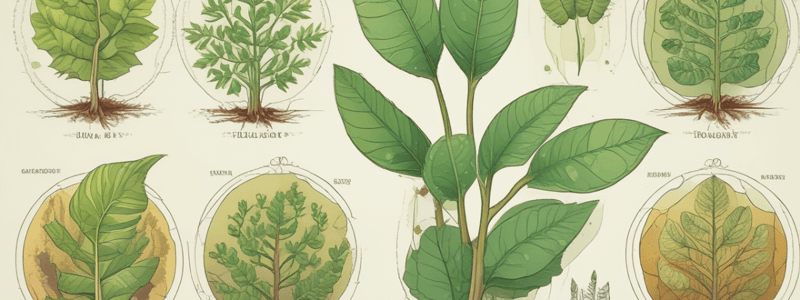Podcast
Questions and Answers
What are the main products produced in the light stage of photosynthesis?
What are the main products produced in the light stage of photosynthesis?
- ATP, Oxygen, Carbon monoxide
- ATP, NADPH, Oxygen (correct)
- Glucose, NADH, Oxygen
- Carbon dioxide, Water, Glucose
What is the primary function of carbon dioxide in the process of photosynthesis?
What is the primary function of carbon dioxide in the process of photosynthesis?
- It provides carbon for glucose synthesis (correct)
- It absorbs sunlight for energy
- It acts as a catalyst in the reactions
- It provides oxygen for the plant
What stage of photosynthesis occurs without light and is enzyme controlled?
What stage of photosynthesis occurs without light and is enzyme controlled?
- Dark reaction (correct)
- Light-dependent stage
- Cyclic photophosphorylation
- Light reaction
Which of the following statements is true regarding the light stage of photosynthesis?
Which of the following statements is true regarding the light stage of photosynthesis?
Which pathway of the light stage produces both ATP and NADPH?
Which pathway of the light stage produces both ATP and NADPH?
What effect does using greenhouses have on the rate of photosynthesis?
What effect does using greenhouses have on the rate of photosynthesis?
In which organelle does photosynthesis take place?
In which organelle does photosynthesis take place?
What is the chemical equation for photosynthesis?
What is the chemical equation for photosynthesis?
What occurs during photolysis in photosynthesis?
What occurs during photolysis in photosynthesis?
Which of the following best describes the process responsible for creating a proton gradient during ATP synthesis in photosynthesis?
Which of the following best describes the process responsible for creating a proton gradient during ATP synthesis in photosynthesis?
Which statement accurately describes the relationship between the light stage and the dark stage of photosynthesis?
Which statement accurately describes the relationship between the light stage and the dark stage of photosynthesis?
What are the end products of the overall photosynthesis reaction as represented in the word equation?
What are the end products of the overall photosynthesis reaction as represented in the word equation?
Which factor is crucial for the light-dependent reactions to take place?
Which factor is crucial for the light-dependent reactions to take place?
What is the primary advantage of conducting photosynthesis experiments using elodea?
What is the primary advantage of conducting photosynthesis experiments using elodea?
What is the main role of NADPH in photosynthesis?
What is the main role of NADPH in photosynthesis?
Which statement about the chemical equation for photosynthesis is correct?
Which statement about the chemical equation for photosynthesis is correct?
Flashcards are hidden until you start studying
Study Notes
Photosynthesis Overview
- Process by which plants synthesize food using light energy.
- Word equation: Carbon dioxide + Water → Glucose + Oxygen
- Chemical equation: 6CO₂ + 6H₂O → C₆H₁₂O₆ + 6O₂
Stages of Photosynthesis
- First stage: Known as Light stage or Light dependent stage.
- Second stage: Referred to as Dark stage or Light independent stage.
- Primary site for photosynthesis: Chloroplasts.
Light Stage Details
- Involves photolysis, where water is separated into high-energy electrons, hydrogen protons, and oxygen using light.
- Two pathways in the light stage:
- Cyclic photophosphorylation
- Non-cyclic photophosphorylation
- Outputs of the light stage include ATP, NADPH, and Oxygen.
Dark Stage Characteristics
- The dark stage is enzyme-controlled.
- Cannot occur without the light stage because it relies on products (ATP and NADPH) generated during the light stage.
Key Components
- Carbon Dioxide: Serves as the carbon source in photosynthesis.
- ATP: Stands for Adenosine Triphosphate; crucial energy carrier in cells.
- Increasing photosynthesis rate can be achieved through methods like using greenhouses.
Experimental Aspects
- Light source used in experiments: Lamp.
- Constant variable: Temperature, maintained using a water bath and thermometer.
- Light intensity was altered by moving the lamp 10 cm at each run.
- Elodea used as the experimental plant due to its ease in counting oxygen bubbles released per minute.
- Measurement of photosynthesis rate is based on bubble count from the plant stem.
Photosynthesis Overview
- Photosynthesis enables plants to create food using light energy.
- Word equation: Carbon dioxide + Water → Glucose + Oxygen.
- Chemical equation: 6CO₂ + 6H₂O → C₆H₁₂O₆ + 6O₂.
Stages of Photosynthesis
- First stage names: Light stage, Light-dependent stage.
- Second stage names: Dark stage, Light-independent stage.
- Dark stage relies on products from the light stage for reactions.
Light Stage Details
- Photolysis is the process of splitting water using light to produce high energy electrons, hydrogen protons, and oxygen.
- Pathway 1: Cyclic photophosphorylation.
- Pathway 2: Non-cyclic photophosphorylation.
- Products of the light stage: ATP, NADPH, Oxygen.
Dark Stage Insights
- Enzyme-controlled processes occur in the dark stage of photosynthesis.
- Role of carbon dioxide: Provides carbon necessary for glucose synthesis.
Key Terms
- ATP stands for Adenine triphosphate.
- The chloroplast is the site where photosynthesis occurs.
- Increasing the rate of photosynthesis can be achieved through greenhouse cultivation methods.
Experimental Considerations
- Light source utilized: Lamp.
- Constant factors: Temperature maintained using a water bath with a thermometer.
- Light intensity varied by adjusting lamp distance by 10 cm for each experiment run.
- Elodea plant suitability: Bubbles from the stem can be easily counted to measure photosynthesis rate.
Studying That Suits You
Use AI to generate personalized quizzes and flashcards to suit your learning preferences.




